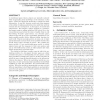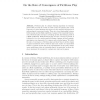14 search results - page 3 / 3 » A General Class of No-Regret Learning Algorithms and Game-Th... |
ATAL
2009
Springer
14 years 2 months ago
2009
Springer
In large systems, it is important for agents to learn to act effectively, but sophisticated multi-agent learning algorithms generally do not scale. An alternative approach is to ļ...
ATAL
2010
Springer
13 years 8 months ago
2010
Springer
Planning how to interact against bounded memory and unbounded memory learning opponents needs different treatment. Thus far, however, work in this area has shown how to design pla...
SIGECOM
2006
ACM
14 years 1 months ago
2006
ACM
In traditional game theory, players are typically endowed with exogenously given knowledge of the structure of the gameāeither full omniscient knowledge or partial but ļ¬xed in...
SAGT
2010
Springer
13 years 6 months ago
2010
Springer
Fictitious play is a simple learning algorithm for strategic games that proceeds in rounds. In each round, the players play a best response to a mixed strategy that is given by the...


